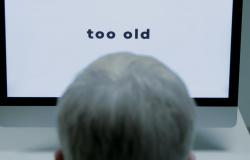The Age of Wisdom, The Age of Foolishness

Scott Montgomery explores how ageism has crept into American politics with possible ramifications for the world.
Ever since Joe Biden somehow found his way to the oval office, the voices of ageism have been singing. The chorus has been both harmonic and monotonous, with the unwavering tones of a Phillip Glass overture. If the U.S. president makes a slip, a “gaff,” an error, or if he trips, stumbles, or stubs a toe, The New York Times no less than USA Today and Fox News will put it, together with his age, among headline stories of the war in Israel and Putin’s latest atrocity in Ukraine. If he actually falls, say off a bicycle, it is a global news event. Whatever the incident, it can only be read as another revelation of Biden’s “advancing years,” his “failing faculties,” his status as someone who, no matter what else he may be, is very old.
I encountered this hard fact at an overlook in the Canadian Rockies during a trip with my older son in June 2022. Gazing out, taking in the glory of rock, space, and sun, I felt my phone buzz and was informed the U.S. Supreme Court had overturned the federal right to abortion. Letting my son know and expressing my incredulity, I was assaulted by the voice of a man nearby who overheard: “What about a president too old to even ride a goddamn bicycle!”
In the latest widely-reported “incident,” the Special Counsel appointed to investigate Biden’s private possession of confidential material, had some choice phrases to offer. This gentleman, Robert K. Hur, a loyal Trump appointee it would appear, declined in his report to recommend prosecution. But in a parting shot, where he abandoned the path of fact for the weeds of speculation, he offered this: “We have also considered that, at trial, Mr. Biden would likely present himself to a jury, as he did during our interview of him, as a sympathetic, well-meaning, elderly man with a poor memory…It would be difficult to convince a jury that they should convict him—by then a former president well into his eighties—of a serious felony that requires a mental state of willfulness.” (p. 6). Translation: No sense going after grandpa in his doddering twilight.
Articles from the left, right, and center echoed the phrase: “well-meaning, elderly man with a poor memory.” This was clever malice by Hur. It had no legal purpose and failed to note the difference between memory and recall (regarding the loaded question put to him, Biden had no problem remembering his son’s death, though he erred in the year). Nonetheless it did its work well. Even so worthy a commentator as Edward Luce in the Financial Times took the bait, writing of “Biden’s declining powers.” Our prestige media, at home and abroad, now speak of Joe Biden’s “popularity problem” as if they had absolutely no role in its creation. In fact, they are its attentive parents, feeding it routinely.
Some reports have recalled similar gaffs, trips, and tumbles for earlier presidents, such as Gerald Ford and Ronald Reagan, as well as for Trump himself, now 78. The latter, of course, has been routinely unable to find or care about the truth on almost any subject, let alone confuse or forget it. He did manage to mix up, however, his opponent Nikki Haley with ex-Speaker Nancy Pelosi, while praising Viktor Orban as “the leader of Turkey,” bragging about defeating Barack Obama in 2016, and claiming that Joe Biden (returned from his days as Obama) would get the US “into World War II.” Confusing Biden this time for FDR seems more meaningful than intended.
But never mind. These errors have little effect in the current environment. What matters is Biden’s age; the number is what really inks the page, the only fact with force. Polls—whose real purpose is to measure the media’s own influence the on public mind—have shown that among Americans eligible to vote, a large majority consider Biden’s age a moderate or serious issue, while a smaller number view Trump’s legal problems (four criminal cases underway) as such.
What about comparison to other officials and statesmen of similar or even greater antiquity. In 2023, there were no fewer than 15 Congresspeople who were Mr. Biden’s age or older, including former Senate majority leader, Mitch McConnell, 82, Senator Chuck Grassley, age 90, and Bernie Sanders, 82 (one such veteran, Diane Feinstein of California, refused to retire and died in office; she was 90). Henry Kissinger, meanwhile, who died in 2023 at 100, continued to write books and articles in his final decade. His co-authors included William J. Perry, Sam Nunn, and, until his death in 2021 (also at 100 years of age), the former Secretary of State, George Schultz. Most of these men were in their 90s when they published a series of important opinion pieces in the Wall Street Journal about the risks of nuclear proliferation and war. Did Reagan himself evidence any symptoms of Alzheimer’s while still in office? The diagnosis was made public in 1994, six years after he left the White House, yet doctor’s reportedly saw signs of the disease in 1989, when performing brain surgery after Reagan fell from a horse (he was 78). Some analyses of his language during press conferences suggest a significant decline by 1988, but this has been strongly rejected by Republicans—not surprising, as Reagan remains a hero to much of the GOP, even in its current impaired condition.
Worrying over Biden’s age beyond all else is a clear sign that one is embracing the rules set down by Trump and his 2016 campaign slur, “sleepy Joe.” The number “81” has been used to put the current president in a different category. Yet only a few years ago, Nancy Pelosi at 81 was the “iron lady” of the House whom Trumpist Republicans raged at for her ferric competence to foil them time and again. A few months before his 80th birthday, Kissinger was appointed head of the 9/11 Commission to investigate the September 11 terrorist attacks. A decade-and-a-half earlier, two of Biden’s Senate colleagues, Robert Byrd and Strom Thurmond, both in their 80s, went head-to-head over GOP policy in Central America. Saying Biden is no Kissinger or Byrd is precisely the point. People are different, and numbers are easily deceiving.
Given the immense stakes at risk in the election this year, fretting over Biden’s years by media influencers can only be taken as a mark of impairment. After his threatening jab that Putin can do whatever he wants to “delinquent” NATO members (even as he himself stands trial for fraud), Trump leaves no doubt—if ever there was one—about the scale of national and global damage he might do. Preferring to highlight Biden’s age in the face of such menace is like complaining about chipped paint when the house is on fire.
Since we’re on the subject, there’s more to consider. Research on average life expectancy (LE) in wealthy nations showed an increase of 5-7 years for most countries between 1990 and 2014. Final levels were 76 (where the US is) up to 85 (Japan, Finland, Switzerland). Forecasts for the next several decades are converging on the idea that, at slightly reduced rates of increase, many nations in Europe will reach or exceed 85 by the 2040s, and averages as high as 90 years or more by 2050 (~84-85 for US). At the same time, the world has already reached “peak child” for this century, a term coined by the late, great statistician Hans Rosling for the number of children under age 5. As a species, we are rapidly aging—living far longer than even a generation ago, and not being replaced one-for-one when we shuffle off this mortal coil.
When they see figures like these, most people don’t tend to imagine the visible changes this will bring. Within two decades, there will be many more 65+, 75+, and 80+ people walking around in every town and city. They—today’s younger boomers, Gen X, and early Millennials—will be nearly a quarter of the US population (~86 million), one of every four (one in three for much of Europe). This could even be larger, should the growing attention to healthier lifestyles, partly brought on by the pandemic, be an established sensibility. A good many will not be the “elderly” of yesteryear. They will be erect, confident, and often vigorous, obvious in all areas of daily life, from streets and subways to cafes and gyms. They will be fully at home with digital technology and will have become the new focus of much commercial, business, and entertainment products and marketing. Those who think it natural for older people to be more retiring, timid, and marginal to daily activities in major cities will find themselves in a wholly new universe.
Much of the advanced world, in other words, and especially the US with its self-anointed youth culture, does not seem ready for this new reality, already in progress. An average life expectancy of 82 means a large part of the population living well beyond this. Yet, everywhere a person becomes a “senior citizen” (instantly, somehow) when they turn 60, at most, 65. “Senior,” moreover, is equivalent to “elderly,” which connotes lost vitality, enfeeblement, out-of-touch, generations behind, needful.
What all this means is that a sizeable number of those in their 70s and 80s, possibly even 90s, will be in positions of authority and power in most sectors of society, including local, state, and national government. In a historical sense, Joe Biden should perhaps be seen not as an example of “too old” but as a forerunner of many future leaders with deep knowledge and matured experience.
What is ageism? According to the American Psychological Association (APA): “discrimination against older people because of negative and inaccurate stereotypes.” An example, aimed at Joe Biden: “it’s time to take the car keys from grandpa” (Luce again). Another: “Biden is in his advancing years…”; he is “the first octogenarian-in-chief,” he should “make room for new blood.” This too (from a recent survey by NBC News, asking participants to respond): “At 81 years old, Joe Biden not having the necessary mental and physical health to be president for a second term.” And, in a great many places, by media commentators: “the president’s age is a liability.” A last instance, in a report that tries hard for balance: “witness a man who has aged…is thinner, his hair wispier, [who] moves more cautiously and speaks more softly.”
It might take a moment to realize that these all qualify as ageism. The APA tells us, after all, that “it’s so ingrained in our culture that we often don’t even notice,” a statement well supported by research on the subject. Those who are old enough (and still in possession of a memory) can speak of when this was no less true for prejudice about ethnicity, gender, LBGTQ, and those with disabilities. Little of this may matter to some, since an ample majority of those over 70 are white and therefore undeserving of any concerns regarding bias. Whatever the reason, the exile of ageism from worries over diversity, equity, inclusion, and belonging seems meaningful.
The argument goes that by privileging youth as the fountain of beauty and creative energy, modernity has traded respect and appreciation for the aged with mockery and scorn. Being “old” is not so much a bad thing as it is an unwelcome sign of decay and the fate of mortality. Demographic realities, however, suggest that a reckoning is soon to arrive. Cicero, in De Senectute, his famous dialogue on old age, noted that everyone hopes to reach this stage of life but wants to deny it when it comes.
This, however, does not seem the case with Joe Biden. It is one of the larger spiritual differences between him and Donald Trump, whose mugging monologues, full of threats, reveals a desperate feeding on the energy of others’ attention. In the history of the world, old kings have been far better for their people than mad ones.
Addendum
On March 7, President Biden delivered a confident State-of-the-Union address that ought to have quieted all commentary about his presumed infirmities. He was forceful, angry, outraged, even taunting of his opponents, but he was also smiling, soft-spoken, hopeful, encouraging, and, in his final words, immensely patriotic. His speech was therefore many things; what it was most assuredly not was the effluent of “a well- meaning elderly man, with a poor memory.” Those words should now be retired. Biden’s performance was a reminder that a person tested by time carries within themselves a lived history of their country, and in some cases, a mind on fire to make it better in an inclusive, generous spirit.
Photo by Ron Lach


